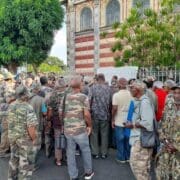Black Immigrant Daily News
News
Dr Rita Pemberton –
Dr Rita Pemberton
COMMISSIONER Hay’s removal from office early in 1892 did not initiate a process to resolve Tobago’s problems.
After submitting a report which confirmed the well-known gravity of the island’s financial situation, his replacement, acting Commissioner Horsford, was replaced by Thomas Rayner, another acting commissioner, towards the end of 1892.
An entire year had passed and nothing significant had been achieved.
By then, however, residents had expressed their views on the problems which faced the island and the direction in which they felt its development should proceed. Trade and aid were the critical components of their plan, which centred on fostering both domestic and international trade, through communication with Trinidad and Barbados as the conduit to the outside world.
In a petition to the Colonial Office, the leading planters and merchants, some local businessmen and teachers identified some historic factors which caused the island’s problems. They blamed the extensive resource wastage of the sugar industry and the onerous association with Trinidad, which they lamented, was largely unfavourable to Tobago.
As an example, it was indicated that the presence of Trinidad Chief Justice John Gorrie had fanned disruptive class relations and stimulated social instability,which negatively affected economic activity. Consequently, sustained economic activity was not possible, and the planting community was unable to generate profits and could not meet its financial obligations. The solution offered was a corrective exercise to mitigate those ills and put the island on a development path, which was only possible with an injection of aid from the imperial government.
In support of the call, the acting commissioner issued an SOS by summarising the condition of Tobago. He said abandoned estates predominated and the few struggling planters lacked the financial resources to continue. He argued that the old-fashioned plantation sector needed modernisation, but the planting community lacked the resources to do so. He advocated assistance to the planters and the development of peasant proprietors to cultivate cocoa and coffee for export and ground provisions to feed themselves.
The Colonial Office maintained its long-established stance: it was interested only in profitable colonies. Unprofitable colonies which would be a drain on the British Treasury were useless to the imperial system. Britain was not going to bail out financially floundering colonies.The Secretary of State firmly denied the request for a loan to revive the sugar industry, but supported the development of a peasantry, but only with the use of local resources. Rayner asked for a reduction in Tobago’s costs for the steamer service and modified crown land regulations.
It was not until the end of the year that a commissioner for Tobago was appointed. On December 8, 1892, Commissioner William Low arrived, having previously served in St Vincent, Grenada and St Lucia.
Low simplified the system of land payments to facilitate the development of a land-owning peasantry, which allowed payments in instalments, despite opposition from Trinidad, and undertook the repair of access roads through crown lands. He explained that the government had no money to give loans to sugar planters, who would receive no assistance from the imperial government, which remained steadfastly consistent in its long-established policy of not giving loans to Tobago. But he considered the sugar planters an important element in the island and was willing to give them what assistance he could.
Recognition that revenue was at the source of the problem, the dominant class argued that Tobago was losing a significant amount of money annually and asked for to be refunded the losses incurred between 1889 and 1892, which amounted to roughly £5000.
However, imperial sentiment was not in support of an arrangement which would undoubtedly favour the island’s government and merchants at the expense of the population. The Secretary of State proposed that the commissioner lay a proposal to the Legislative Council for the payment of a yearly allowance to Tobago for loss of revenue incurred because of union. The amount to be paid was to be determined by a select committee of which Low was to be a member.
Greater efforts were made to collect outstanding house and land taxes, with stricter regulations for handling defaulters, which included empowering the deputy marshal to levy on them.
Planters were prevented from forfeiting a part of their estates to the crown in lieu of taxes. So far 1,400 acres had been received by the crown, but the financial deficit remained.
Then came the voice of the people, in a petition with 1.016 signatures from across the society, including the black landowners and members of the labouring class, in December 1893. They asked for closer union with Trinidad because the partial arrangement was unsatisfactory.
They also suggested that around-the-island steamer service from Barbados with connections with Tobago and Trinidad would provide a valuable link between Tobago’s agricultural producers, nearby markets and international shipping.
Low disagreed with the petition, which he saw as the work of a few radicals, and of course, if implemented, his job would become redundant. The planter element was aghast at the menial position Tobago was being put in, and hoped their voice would persuade the Colonial O ffice to reject it.
In August 1894 members of Tobago’s planter class submitted a petition to oppose the implementation of ward status and advocated a return to the status quo on the grounds that the union had proven disadvantageous to Tobago. Closer union, they argued, would mean higher taxes, a further loss of revenue, a diversion of profits which would affect the merchants and expose Tobago to corrupt administration and a loss of its identity. They said that improved communication had not occurred and asked for Tobago to be replaced under the Windward Islands Government. There was a rift between the rulers.
Yet the island’s financial situation continued to worsen and Low, who was surviving by using the proceeds of the Post Office Savings Bank and postal orders to pay public servants, argued that these were temporary measures which would be offset when house and land taxes were received by September. Insisting the island was not bankrupt, he planned further cuts in the civil service as he tried to create an impression of a healthier financial state.
The result was conflicts within Tobago and between the dominant classes of the two islands. Tobago’s officials were constantly quarrelling because there was disunity among groups on the policy directions for the island. The Tobago leading planters were against Low who they considered overbearing. His financial policies failed to bear fruit and the cocoa initiative made little progress and no investors were attracted to the island. Low was not favoured by the Trinidad ruling class who disapproved of his crown lands policy and there was a rift between the Tobago planters and Governor Broome, who was chastised by the imperial government and blamed for his incompetence. The 1897 Royal Commission was established to investigate and recommend on the state of the island. It recommended complete union.
Tobago planters were extremely disappointed that the imperial government accepted the call for closer union. Ward status for Tobago was hastily adopted, as the answer to the island’s problems was seen as complete customs union and making Tobago a ward in the colony of Trinidad and Tobago.
After the first phase of union, Tobago had two incompetent commissioners, who failed to develop trade, vainly sought imperial aid and were unable to halt the financial crisis.
NewsAmericasNow.com











